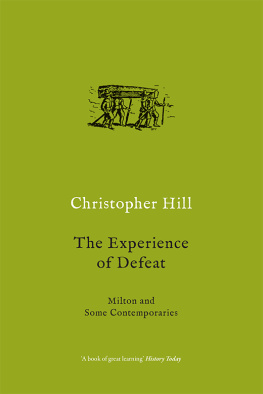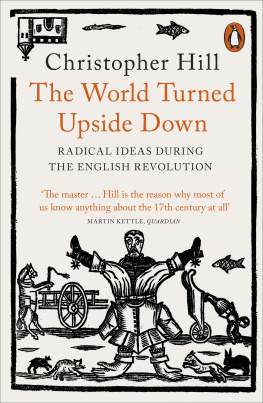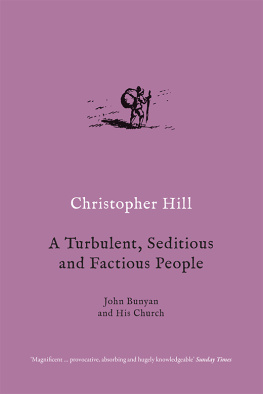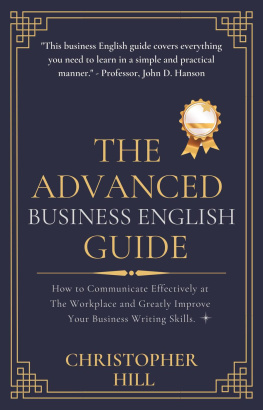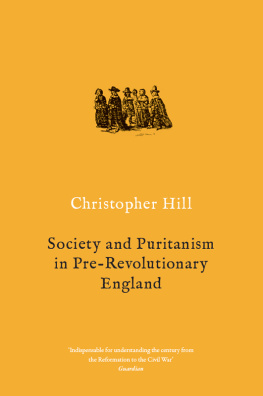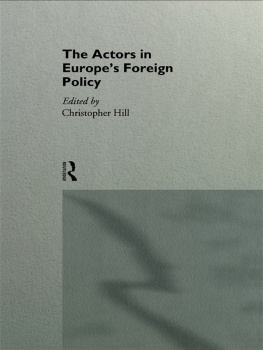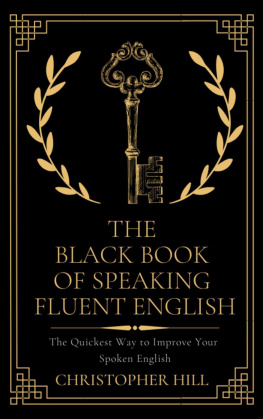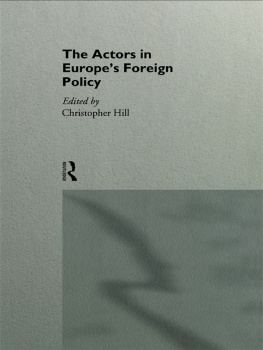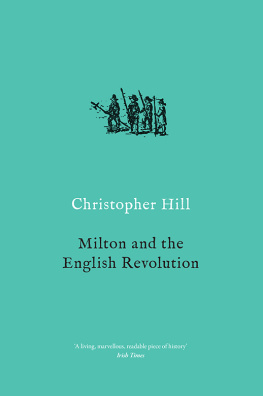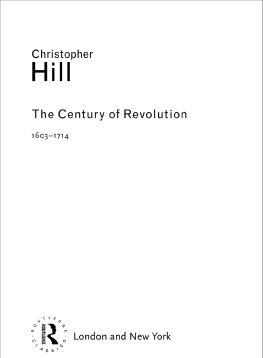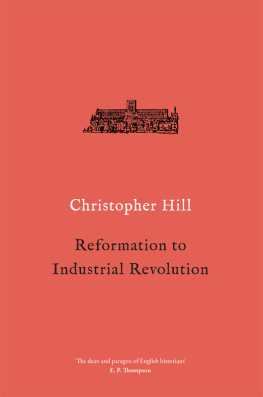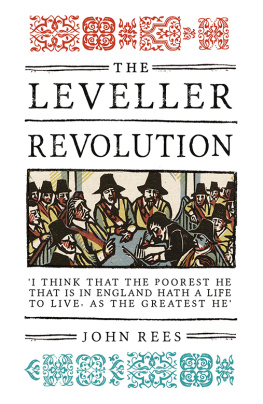For Norman O. Brown,
in gratitude for fifty years friendship, stimulus and provocation
In this book I have modernized seventeenth-century spelling and punctuation (except for titles of books and pamphlets); years are given in the new style. I have tried to give references for any statements made, except for biographical facts to be found in the Dictionary of National Biography.
In the past I have thanked employers for allowing me leave of absence. Since my, retirement my gratitude goes to those who have given me employmentthe Open University from 1978 to 1980, where I was a Visiting Professor and member of a team producing a course on seventeenth-century English civilization; the Humanities Research Centre of the Australian National University, Canberra, and Rutgers University, New Jersey, at each of which I was a Visiting Professor for three months of 1981. I am most grateful to colleagues and students at these institutions for useful discussions on (among many other things) some of the ideas in this bookespecially to Cicely Havely, Ann Hughes (now at Lancaster University), Arnold Kettle, Anne Laurence, Bob Owens, John Purkis and Kevin Wilson of the Open University. I am still benefiting from a seminar on Milton which I gave at the Folger Library in 1976: Joan Bennett, Georgia Christopher, Joseph Martin, Jean Moss, Jason Rosenblatt, Florence Sandler and Brenda Szittya continue to ply me with ideas, many of which have been incorporated in this book.
I have greatly profited from the generosity of fellow scholars who allowed me to read work in progress, particularly Hugh Barbour, Alan Cole, Jackie DiSalvo, Ian Donaldson, J. R. Jacob, A. M. Johnson, Nicholas Jose, John Laydon, J. F. McGregor, Ruth Perry, Gary Puckrein, Barry Reay, Sheila Reynolds, Paul Salzman, David Taylor and C. M. Williams. I have also benefited from discussing the seventeenth century with W. M. Lamont, Peter Linebaugh, Gill Parker, Lady Radzinowicz, Marcus Rediker, Stella Revard, Judith Richards, Judith Sproxton and John Walter. I hope I have acknowledged in the footnotes where I am conscious of having drawn on their ideas. My thanks go especially to Alan Cole, whose splendid essay on The Quakers and Politics, 165260 started me thinking on the subject of this book nearly thirty years ago; to J. R. Jacob, whose work I have pillaged shamelessly in Chapter Eight, section 3; and to Bernard Capp (Chapter Three, section 1) and Barry Reay (Chapter Five). Penelope Corfield gave me much needed encouragement at an early stage. Austin Woolrych read the whole typescript and saved me from many howlers as well as generously suggesting useful improvements. But none of them bears any responsibility for what has emerged.
Diana Levinson very kindly read the proofs.
In the past I fear I have always taken Balliol College Library for granted: I should like to make amends by thanking very warmly the successive LibrariansVincent Quinn and Penny Bulloughand Alan Tadiello for innumerable patient kindnesses over many years. My warmest thanks, not for the first time, go to Bridget for unfailing help, counsel, stimulus and support.
C. H.
March 1983
The following abbreviations have been used in the footnotes:
| CPW | Complete Prose Works of John Milton, 8 vols. (Yale UP, 195382) |
| CSP Dom | Calendar of State Papers, Domestic |
| DNB | Dictionary of National Biography |
| EHR | English Historical Review |
| Gangraena | Thomas Edwards, Gangraena (3 parts, 1646) |
| HMC | Historical Manuscripts Commission |
| JFHS | Journal of the Friends Historical Society |
| MER | C. Hill, Milton and the English Revolution (1977) |
| P. and P. | Past and Present |
| PL | Paradise Lost |
| PR | Paradise Regained |
| SA | Samson Agonistes |
| TRHS | Transactions of the Royal Historical Society |
| UP | University Press |
| VCH | Victoria County History |
| WTUD | C. Hill, The World Turned Upside Down (Penguin edn., 1975) |
THE EXPERIENCE OF DEFEAT
In an historian we are not to be critical for every punctilio, not relating to his main design; yet I think tis but just to demand that what he doth write be true.
Henry Stubbe, The Lord Bacons Relation of the Sweating-Sickness Examined (1671), p. 2
T his book derives from two others which I published in the 1970s. In The World Turned Upside Down (1972) I tried to present the ferment of radical ideas which welled up in England in the revolutionary 1640s and 1650s. I suggestedalmost as an afterthoughtthat Milton in the 1640s shared much of the Wordsworthian excitement of those days when it was bliss to be alive, but to be young was very heaven. This excitement comes across in Areopagitica and The Tenure of Kings and Magistrates. In Milton and the English Revolution (1977) I tried to work out in more detail Miltons relationship to the radical ideas of the Revolution, and to suggest that for him the defeat of the Revolution which he had believed to be Gods Cause, and to which he had given up the best years of his life, was a shattering blow. The three great poems of his last years represent, among many other things, his attempt to come to terms with this defeat: to rethink his whole position in order to be able to Assert eternal Providence/And justify the ways of God to men. Milton started Paradise Lost in about 1658, and finished it in 1665. In these years he was alone only in his genius. Many others were querying either the goodness or the omnipotence of a God who had apparently so badly let down his servants. The present book attempts to survey the reactions of other radicals to the experience of defeat.

